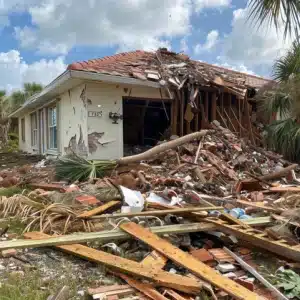Key Takeaways
- Insurance claims can be rejected due to non-disclosure of facts, misrepresentation, policy coverage discrepancies, untimely reporting of damages, not following the claims process, or suspicion of fraud.
- Adequate documentation, timely action, adherence to policy terms, and proof of loss forms are critical to avoid claim denials and ensure proper compensation.
- Policy lapses due to missed premium payments, damages from uninsured risks or ‘Acts of Nature’, and insurance fraud are key factors that can lead to claim rejections; seeking professional help from public adjusters or legal counsel can aid in disputed claims.
Let's Go Beyond, to Bring You Back
Let's get you the compensation you're entitled to. Get a FREE Consultation today.
Let's Go Beyond, to Bring You Back
You deserve the compensation you’re entitled to, call for your FREE Case Review today.
Understanding Claim Rejections: When and Why They Happen
Understanding why property insurance claims are rejected is crucial for the successful navigation of insurance dealings and for avoiding potential pitfalls. Filing a property insurance claim can be a complex process, and claim rejections can stem from several issues, including non-disclosure of facts, discrepancies in policy coverage, and common pitfalls and exclusions. These rejections are not merely bureaucratic hurdles; they can significantly impact your financial recovery and peace of mind.
Claims may be denied if damage was already present before the policy was enacted, due to negligence in maintaining fire safety equipment, or if arson is suspected. Compliance with policy terms and honest communication, including detailed damage reports and participating in an examination under oath if required, are essential to prevent fire claims rejections and ensure a smooth fire claims process.
Now, let’s dive deeper into two common reasons for claim rejections: non-disclosure or misrepresentation of facts and discrepancies in policy coverage.
Non-Disclosure or Misrepresentation of Facts
Misrepresentation in insurance claims refers to providing false or inaccurate information during the application process. This can lead to a denied claim if the insurance company discovers that the policyholder has not been truthful or has omitted critical details. Imagine purchasing a homeowner’s insurance policy and failing to disclose previous water damage. When a subsequent claim for water damage is made, the insurer might deny it based on this non-disclosure.
The crux of this issue lies in the trust between the policyholder and the insurance company. Good faith requires that all parties act honestly and transparently. Providing accurate information is not just a legal obligation; it’s a safeguard against potential claim denials.
Fraudulent claims, whether intentional or due to oversight, can lead to severe consequences, including legal action and a permanent mark on your insurance record.
Discrepancies in Policy Coverage
Discrepancies in policy coverage often become apparent when a claim is filed. Insurance policies often exclude specific types of fire damage, such as that caused by defective workmanship or faulty construction can be denied due to disputes over liability. These exclusions are not always obvious to homeowners, leading to unexpected rejections when claims are made.
Underinsurance is another critical issue. When the insurance coverage amount is less than the total property value, insurance coverage disputes over property valuation can arise, reducing the compensation offered to the insured. Claims can also be rejected if the damages are not covered by the policy, such as certain types of water damage that homeowners might incorrectly assume are covered. Understanding your policy’s specific exclusions and ensuring adequate coverage is essential for avoiding these pitfalls.
Insurance Claims Lawyers
Get Compensated For Your Injuries & Damages! Call Us For A FREE Case Review And Know What Your Case Is Worth.
The Significance of Timely Action in Claims
Timely reporting of damage is paramount in the insurance claims process. Failure to report promptly can lead to claim denial due to an impaired investigation. Insurance policies typically require claims to be reported within a specific timeframe, and submitting a claim too late can result in its rejection. The rationale behind this is simple: the sooner damage is reported, the easier it is for insurers to assess and validate the claim.
Initiating repairs before submitting a property damage claim can also cause denial, as insurers need to assess the damage firsthand. This highlights the importance of following the proper claims process and communicating with your insurer promptly. Next, we explore the specific consequences of late notifications and the importance of adhering to filing deadlines.
The Consequences of Late Notifications
Delays in reporting an insurance claim can lead to skepticism from the insurer regarding the validity of the claim and may result in denial if the insurer’s investigation is compromised. Late notifications can significantly increase the complexity and cost of the claim. This is because delayed reports can lead to:
- further damage and complications that make the claim harder to assess
- difficulties in gathering evidence and documentation
- disputes over the cause and extent of the damage
- challenges in determining liability
It is important to report an insurance claim to your insurance company promptly, as this ensures a smooth and efficient claims process.
Adhering to notification clauses in insurance policies is vital as failure to do so can invalidate a claim, even if no prejudice has been caused to the insurer as a result of the late notification. Late notifications can be seen as a breach of ‘condition precedent’ in an insurance policy, which may result in the insurer denying coverage for the entire claim. Therefore, timely reporting is not just a recommendation but a crucial requirement.
The Deadline for Filing Claims
Understanding and adhering to the deadline for filing claims is crucial to avoid claim denial due to late submissions. Policies typically stipulate the required timeframe for notifying an insurer about a claim, often mandating notification to be immediate or as soon as possible. Filing claims ‘promptly’ or ‘within a reasonable time’ is essential, with certain states imposing specific deadlines, such as 30 days in no-fault insurance systems.
Filing a lawsuit is subject to statutes of limitations, which are separate from insurance claim filing deadlines. Failure to observe these deadlines can result in a claim being denied. Staying up to date with these requirements and acting swiftly ensures that your claims process is smooth and your chances of successful compensation are maximized.
Proving Your Loss: Documentation and Evidence
Proper documentation and evidence are essential for proving property damage and ensuring a successful insurance claim. Here are some steps to follow:
- Take extensive photos and videos post-incident to accurately document the damage.
- Create a detailed written inventory of damaged property, including item descriptions and values.
- This evidence is pivotal in supporting your claim and providing the insurer with a clear picture of the damage.
Policyholders are responsible for:
- Preserving damaged items for the adjuster’s inspection to ensure their claim is not compromised
- Failure to preserve damaged property before an adjuster’s examination can significantly weaken the validity of the claim
- Securing professional assessments can provide an objective valuation and are vital for supporting property damage claims.
Next, we explore the specific roles of Proof of Loss forms and accurate damage assessments in the claims process.
The Role of Proof of Loss Forms
The Proof of Loss form is a document typically required for insurance claims. It outlines the specifics of the damage and the repairs needed. This form is crucial for the claims process as it provides the insurer with detailed information to assess the claim accurately.
A delayed submission of the Proof of Loss form can lead to the insurance company rejecting the claim. Therefore, submitting this form promptly is essential to ensure that the claims process proceeds smoothly and without unnecessary delays.
Importance of Accurate Damage Assessment
Accurate damage assessment and documentation are vital for a comprehensive claim assessment and securing a fair settlement from the insurer. Understanding the distinction between negligence and normal wear and tear is crucial to maintaining one’s property and avoiding complications in the claims process.
Proper maintenance and repair of issues such as leaks are vital in preventing damage that insurance companies might classify as negligence, potentially leading to claim rejection. To ensure a comprehensive claim assessment and secure a fair settlement from the insurer, it is important to:
- Provide a Proof of Loss form, complete with documented evidence of property damage.
- Obtain repair estimates to support the claim.
- Conduct thorough assessments to document all losses.
By following these steps, you can increase the chances of a successful insurance claim.
Premium Payments and Policy Lapses
Missed premium payments and policy lapses can lead to the rejection of any claims filed during the period of lapsed coverage. A lapsed policy means coverage is inactive during the lapse due to missed payments, and claims made in this period are likely to be denied, similar to having no insurance.
To avoid policy lapses and maintain continuous coverage, it’s essential for policyholders to make their premium payments on time. Keeping up with premium payments ensures that your coverage remains active and that you are protected in the event of a claim.
Acts of Nature and Uninsured Risks
Standard homeowners insurance policies commonly exclude coverage for certain natural disasters such as floods and earthquakes, as well as damage caused by pests. To ensure protection against these exclusions, homeowners need to purchase additional coverage tailored for those specific risks. ‘Acts of God’ such as tornadoes, hurricanes, tsunamis, or volcanic eruptions represent unpredictable natural events that are often uninsured perils in standard policies. Understanding the gaps in standard policies is crucial for homeowners and property managers to prevent claim rejections and obtain appropriate additional coverage for disasters.
The Pitfalls of Insurance Fraud
Committing insurance fraud is a crime that can result in probation, fines, community service, restitution, and even imprisonment. A conviction for insurance fraud can carry a fine of up to $50,000 and a prison sentence of up to five years. Insurance fraud schemes may include staging false incidents, inflating the extent of damages, or billing for services that were never rendered.
Engaging in fraudulent activities such as exaggerating damages or making false claims can lead to a fire insurance claim being denied. Intentional deceit or fraudulent claims can lead to immediate claim denial by insurance companies. These actions not only jeopardize your current claim but can also lead to long-term consequences, including legal action and a tarnished insurance record.
Insurance Claims Lawyers
Get Compensated For Your Injuries & Damages! Call Us For A FREE Case Review And Know What Your Case Is Worth.
Navigating Complexities: Public Adjusters and Legal Counsel
Public adjusters are professionals who specialize in handling insurance claims and work to ensure policyholders receive the maximum settlement rightfully due to them. Engaging with public adjusters often results in policyholders receiving higher compensation for their claims, supported by statistical evidence and expertise in dealing with complex issues.
Policyholders can challenge a rejected claim by filing an appeal with the insurance company or by seeking assistance from an insurance dispute attorney or public adjusters who manage complex claims and ensure fair settlements.
Legal counsel from Wyly & Cook is crucial for policyholders facing claim denials, providing guidance, challenging bad faith practices, and representing the insured in legal proceedings.
Summary
In summary, understanding the reasons behind property insurance claim rejections is essential for navigating the claims process successfully. From the importance of timely action and accurate documentation to the nuances of policy coverage and the pitfalls of misrepresentation, each aspect plays a crucial role in ensuring your claim is approved.
By being proactive, transparent, and thorough, you can avoid common pitfalls and secure the compensation you deserve. Remember, your home is your most valuable asset, and protecting it requires diligence and knowledge. Stay informed, stay prepared, and ensure your peace of mind.
Frequently Asked Questions
What are common reasons for property insurance claim denials?
The common reasons for property insurance claim denials include non-disclosure of facts, discrepancies in policy coverage, and failure to report damage promptly. Be sure to provide accurate information and report any damage as soon as possible to avoid claim denials.
How important is timely reporting in the claims process?
Timely reporting is crucial in the claims process as delays can impair the investigation and lead to claim denial. It is important to report promptly to ensure the process runs smoothly and efficiently.
What is a Proof of Loss form?
A Proof of Loss form is a document that details the damage and necessary repairs, and it must be submitted promptly to prevent claim rejection.
Can missed premium payments affect my coverage?
Yes, missed premium payments can result in policy lapses and lead to claim denials during the lapsed coverage period. It’s important to stay current on premium payments to maintain coverage.
How can public adjusters and legal counsel help in the claims process?
Public adjusters and legal counsel can help navigate complex claims, challenge rejected claims, and secure fair settlements, ultimately leading to higher compensation.




